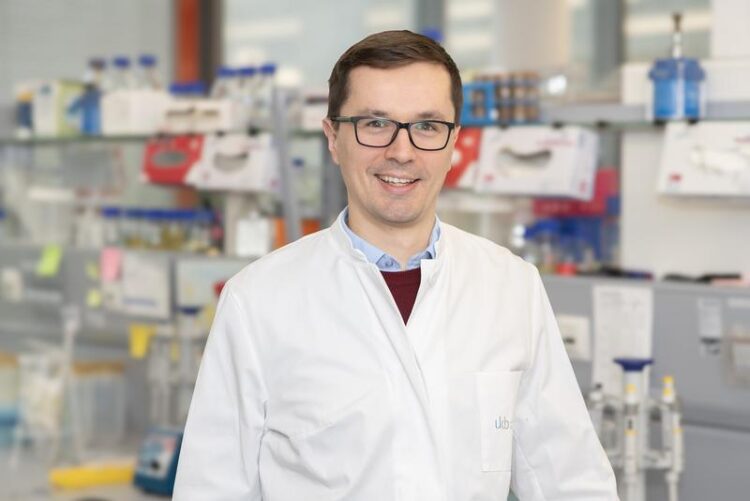Expert in the targeted degradation of proteins Radosław

Expert in the targeted degradation of proteins Radosław P. Nowak is Professor of Immune Engineering and Drug Discovery at the University Hospital Bonn.
(c) Rolf Müller / University Hospital Bonn
P. Nowak is Professor of Immune Engineering and Drug Discovery.
Prof. Radosław P. Nowak has taken up the new professorship for “Immune Engineering and Drug Discovery” at the Institute of Structural Biology at the University Hospital Bonn (UKB). The 36-year-old biochemist will strengthen the Cluster of Excellence ImmunoSensation2 at the University of Bonn scientifically in the field of systems immunology. He also wants to actively promote the topic of “drug discovery” in Bonn on an interfaculty basis and with non-university institutes. The aim is to create a high-performance, internationally competitive center for drug discovery.
Prof. Nowak’s academic training took him first to Oxford and then to Boston. He now comes from the Center for Protein Degradation (CPD) at the Dana-Farber Cancer Institute/Harvard Medical School.
“Proteins are converted in the cell in a natural way,” says Prof. Nowak, who wants to use such recycling processes to discover new drugs. Proteins are broken down by the so-called ubiquitin-proteasome system. Special enzymes, known as E3 ligases, bind misfolded and dysfunctional proteins and modify them with ubiquitin which is a tag for their destruction by the proteasome – a cellular waste disposal system where proteins are chopped into pieces and recycled. Proteolysis targeting chimeras (PROTACs) or molecular glue degraders can hijack this natural degradation process, and direct them to proteins previously considered non-therapeutically targetable. The dumbbell-shaped PROTACs stick the target protein to the E3 ubiquitin ligase via their two binding arms, allowing for transfer of ubiquitins and causing subsequent degradation by the proteasome. “We call this targeted protein degradation. This is because we can now develop PROTACs or find molecular glue degraders with which we can specifically attack proteins that were previously difficult to combat,” says Prof. Nowak.
His dream is to contribute to the discovery of new drugs
Together with his team, he wants to find out how protein interactions within a cell can be redesigned for therapeutic benefit in this way. “The feeling that we have discovered something new is exciting. In current research, the discovery is a team effort and that’s what makes it so special,” says Prof. Nowak. For this reason, he would like to create a long-term network at the UKB and the University of Bonn that focuses on various aspects of drug discovery. It will involve clinicians, basic researchers and the biotechnology sector in order to organize research and lead it towards therapeutic development. “Being embedded in a hospital at UKB, I find it particularly important to focus on research that has translational potential. Drug discovery is a challenging and sometimes lengthy process, but it always starts with a fundamental discovery and often with a chemical or biological tool. In my lab, which focuses on targeted protein degradation and small molecule-induced proximity, I want to develop these novel technologies, discover new mechanisms of action of small molecules and further develop them for therapeutic potential,” says Prof. Nowak.
The biochemist was happy to come to Bonn because the UKB and the University of Bonn have put together a number of outstanding research groups with a strong focus on immunology. “The combination of immunology with cutting-edge technologies such as chemistry, proteomics, nanobodies, structural biology or gene editing fits perfectly with my expertise in targeted protein degradation, induced proximity and the discovery of small molecules for drugs,” says the father of three children, who travels and does sports – skiing or cycling – in his spare time. He would love to return to gliding – one of his hobbies from his university days.
Press contact:
Dr. Inka Väth
Deputy Press Officer at the University Hospital Bonn (UKB)
Communications and Media Office at Bonn University Hospital
Phone: (+49) 228 287-10596
E-mail: inka.vaeth@ukbonn.de
About Bonn University Hospital: The UKB treats around 500,000 patients per year, employs around 9,000 staff and has total assets of 1.6 billion euros. In addition to over 3,300 medical and dental students, a further 585 people are trained in numerous healthcare professions each year. The UKB is ranked first among university hospitals in NRW in the science ranking and in the Focus clinic list and has the third highest case mix index (case severity) in Germany. In 2022 and 2023, the F.A.Z. Institute recognized the UKB as Germany’s most desirable employer and training champion among public hospitals in Germany.
Media Contact
All latest news from the category: Health and Medicine
This subject area encompasses research and studies in the field of human medicine.
Among the wide-ranging list of topics covered here are anesthesiology, anatomy, surgery, human genetics, hygiene and environmental medicine, internal medicine, neurology, pharmacology, physiology, urology and dental medicine.
Newest articles

Recovering phosphorus from sewage sludge ash
Chemical and heat treatment of sewage sludge can recover phosphorus in a process that could help address the problem of diminishing supplies of phosphorus ores. Valuable supplies of phosphorus could…

Efficient, sustainable and cost-effective hybrid energy storage system for modern power grids
EU project HyFlow: Over three years of research, the consortium of the EU project HyFlow has successfully developed a highly efficient, sustainable, and cost-effective hybrid energy storage system (HESS) that…

After 25 years, researchers uncover genetic cause of rare neurological disease
Some families call it a trial of faith. Others just call it a curse. The progressive neurological disease known as spinocerebellar ataxia 4 (SCA4) is a rare condition, but its…





















